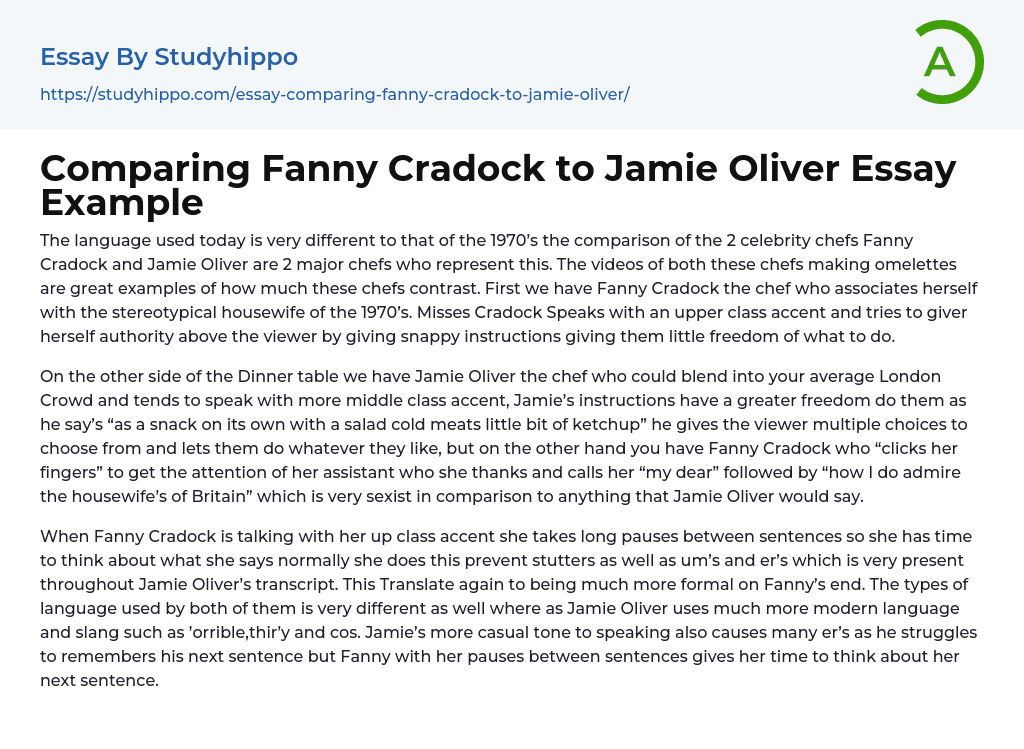The language employed in the present era differs considerably from that of the 1970s. By examining two renowned chefs, Fanny Cradock and Jamie Oliver, we can observe how they exemplify this transformation. The videos featuring both chefs preparing omelettes serve as outstanding illustrations of their differing approaches. Initially, we encounter Fanny Craddock, who personifies the archetypal housewife prevalent in the 1970s. She communicates with an upper-class accent and endeavors to assert dominance over the viewer by offering precise instructions, thereby restricting their autonomy.
Jamie Oliver, a chef who can easily blend into a typical London crowd, sits on the opposite side of the Dinner table. He tends to speak with a more middle-class accent and offers flexible instructions. He suggests various options for enjoying the dish, including having
...it as a snack by itself, with a salad, cold meats, or even a bit of ketchup. Jamie gives viewers multiple choices and encourages them to do whatever they prefer. In contrast, Fanny Cradock gets her assistant's attention by "clicking her fingers" and thanks her while referring to her as "my dear." She then proceeds to express admiration for the housewives of Britain in a highly sexist manner compared to anything Jamie Oliver would say.
When Fanny Cradock speaks with her upper-class accent, she deliberately pauses between sentences to allow herself time to think before speaking. This technique helps her avoid stutters, "um's," and "er's," which are present in Jamie Oliver's transcript. Fanny's speech style is much more formal compared to Jamie's. Furthermore, their choice of language is also very different; Jamie Oliver uses more modern slang terms such as "’orrible," "thir’y," and
"cos." Jamie's casual tone and struggle to remember his next sentence often result in frequent "er's." On the other hand, Fanny's pauses between sentences allow her time to think about what she will say next.
- Second Language essays
- English Language essays
- Semiotics essays
- Dialect essays
- Sign Language essays
- Spanish Language essays
- French Language essays
- Language Education essays
- Second Language Acquisition essays
- Teaching English As A Foreign Language essays
- Verb essays
- Gesture essays
- Society essays
- Stereotypes essays
- Social Change essays
- Sociological Perspective essays
- Social Movement essays
- Charity essays
- Social Science essays
- Anthropology essays
- Generation essays
- Social Status essays
- Social Stratification essays
- Emile Durkheim essays
- Sociological Imagination essays
- Sociological Theories essays
- Race essays
- Gender Roles essays
- Interpersonal Relationship essays
- Social Class essays
- People essays
- Globalization essays
- Audience essays
- Web Dubois essays
- Cultural Competence essays
- Culture essays
- Social Control essays
- Citizenship essays
- Social Justice essays
- Caste System essays
- Social Responsibility essays
- Socialization essays
- Deviance essays
- Modern Society essays
- Popularity essays
- Civil Society essays
- Community essays
- Female essays
- Filipino People essays
- Igbo People essays




